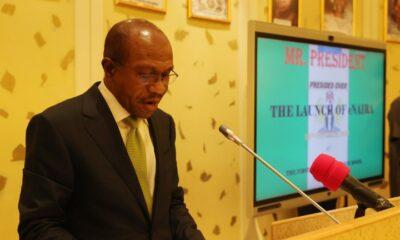- Experts Fault CBN’s Cashless Policy
Economic and financial experts have started telling the Central Bank of Nigeria (CBN) to ease charges being levied on consumers following the imposition of fees on cash deposits and withdrawals.
Prior to the implementation of processing fees on withdrawals and deposits on Wednesday, the Federal Executive Council had approved a 44 percent increase in Value Added Tax (VAT) to 7.2 percent.
A month earlier, the Federal Inland Revenue Service (FIRS) had announced 5 percent VAT on all online transactions starting from 2020.
The number of charges being levied on the average consumer in an economy barely growing is alarming and counterproductive to the CBN economic growth and financial inclusion plans.
The new circular mandated Deposit Money Banks to charge corporate account owners 5 percent processing fee on withdrawals more than N3 million and 3 percent on deposits of same. Meaning, each time network is down, Nigerian businesses would have to pay N300,000 to deposit N10 million or N500,000 to withdraw the same amount.
For individuals, they will have to pay 2 percent processing fee on deposits more than N500,000 and 3 percent withdrawal fee on the same amount.
Despite the central bank explaining that the directive is to develop Nigeria’s payment system in line with its vision 2020 goal of being among top 20 economies by next year, experts say to grow the Nigerian economy, the apex bank needs consumer spending and new investments.
But the new charges and the ones in the pipeline being pushed for approval would hurt consumer buying power, erode savings, weigh on new job creation and impede profitability of businesses.
Still, majority thinks the cashless policy is a good move as it would help CBN manage and regulate cash better. However, the economy is just recovering with numerous headwinds that has crippled both businesses and individuals in terms of earnings and growth.
Mr. Godwin Eohoi, the Registrar, Chartered Institute of Finance and Control of Nigeria, said: “The move by the CBN to promote cashless policy is commendable because it has some benefits such as reducing the amount spent by the apex bank in cash management.
“However, the Nigerian economy is still fragile and at a time when the CBN is promoting financial inclusion, it would not be fair to impose additional charges on bank customers that are already overburdened with different types of charges from banks.
“The cash deposit and withdrawal fee announced by the CBN is too high. They should reduce it to 0.5 per cent for transactions involving individuals and 1.5 per cent for corporate companies.”
Almost 70 percent of bankable adults are still unbanked, according to the CBN. Imposing additional fees on existing customers while campaigning for broad financial inclusion to grow the sector is counterproductive.
Mr. Timothy Olawale, the Director-General, Nigeria Employers Consultative Association (NECA), explained that the new charges will lead to unnecessary withdrawal burden as businesses and individuals will start working within stipulated limits to avoid charges.
He said, “Though the overall aim of reducing cash transactions is good, the policy will, however, increase the cost of doing business and force organisations and individuals to start multiple deposits and withdrawals in order to beat the charges.”
The Director-General, LCCI, Mr Muda Yusuf, who obviously thinks the cashless policy is good but the implementation needs adjustment, said the notice given by the CBN was just too short and could disrupt service in the banking sector.
He said, “The latest circular by the CBN should have given a much longer notice to economic players. The notice given for the effective date is extremely short. The circular was dated 17th of September while the effective date was 18th of September.
“This is just a notice of one day. This would have short-term disruptive effects. We implore the CBN to give at least two months to allow for players in the economy to adequately prepare themselves. This is particularly so for investors who are major players in the retail segment of the economy.”
A logistics expert and the CEO of Hermonfield, Mr Tunji Olaosun, said both the CBN and FIRS directives are contradictory.
According to him, while the CBN is pushing for a cashless policy, the FIRS is telling people it will impose 5 percent VAT on all online transactions.
He said, “It appears they don’t talk to themselves because of the conflicting signals coming from them.
“From the CBN’s instruction, it shows that the CBN wants to discourage cash transactions and encourage cashless transactions. But at the same time, the FIRS is saying it will impose tax on transactions done online.
“So in essence, if we carry cash, CBN penalises us; if we do cashless, FIRS taxes us. So, which one do they want us to do? Both are agencies of the Federal Government which means the ministry they are confusing Nigerians.”



 Naira4 weeks ago
Naira4 weeks ago


 Naira4 weeks ago
Naira4 weeks ago


 Travel4 weeks ago
Travel4 weeks ago


 Jobs4 weeks ago
Jobs4 weeks ago
 Naira4 weeks ago
Naira4 weeks ago
 Naira3 weeks ago
Naira3 weeks ago
 Investment4 weeks ago
Investment4 weeks ago
 Travel4 weeks ago
Travel4 weeks ago


















